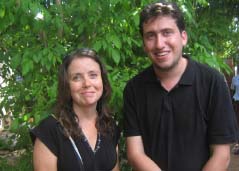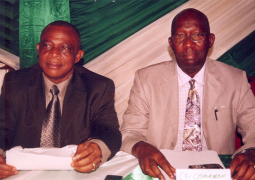
Officials of the US based Worldwatch Institute have been talking about the plight of African farmers throughout their tour of the sub-Saharan Africa.
Worldwatch Institute's Sustainable Agriculture Program highlights the benefits to farmers, consumers and ecosystems that can flow from food systems that are flexible enough to deal with shifting weather patterns, productive enough to meet the needs of expanding populations, and accessible enough to support rural communities.
Speaking to Danielle Nierenberg, the Senior Researcher for Worldwatch Institute, said they arrived in The Gambia last week for a two-week mission to talk to farmers and many others on the ways poor farmers can increase their yield.
"We are not here to teach anything but rather to learn from each other and to tell real stories about Africa upon our return since we only had of bad stories about the continent. The news media in the West tends to be very negative in their coverage about Africa. Sometimes it seems that all you hear are stories about conflict, HIV/AIDS, famine, and disease. While this problems need to be covered, the real news tends to be missed -- stories of hope and success providing a path for communities to lift themselves out of poverty," she said.
Noting that they would be talking to different project officials in the country, he said, they are also interested in seeing donor monies go to the right places.
"We are interested to know which projects are really working well and have so far visited 150 projects all over the continent, including the oyster project here in The Gambia."
Danielle further revealed that they want an exchange of innovations that are replicable between different African farmers.
"We are also attempting to assess the state of agricultural innovations from cropping methods to irrigation technology to agricultural policy with an emphasis on sustainability, diversity, and ecosystem health, as well as productivity," said Nierenberg
Bernard Pollack, Communications Consultant with Worldwatch-Nourishing the Planet, said that they want people to tell their own stories. The African tour, he said, offered them an exciting opportunity to learn what farmers in the continent are doing.
The Nourishing the Planet project will assess the state of agricultural innovations - from cropping methods to irrigation technology to agricultural policy - with an emphasis on sustainability, diversity, and ecosystem health, as well as productivity.
The project aims to both inform global efforts to eradicate hunger and raise the profile of these efforts. The project will also consider the institutional infrastructure needed by each of the approaches analyzed, suggesting what sort of companion investments are likely to determine success - from local seed banks to processing facilities, from pro-poor value chains to marketing bureaus.
He further revealed that the project will culminate in the release of State of the World 2011, a comprehensive report that will focus on agriculture and will be accompanied by derivative briefing documents, summaries, videos and podcasts.
This volume will be a roadmap for foundations and international donors interested in supporting the most effective agricultural development interventions in various agro-ecological and socio-economic contexts. The project's findings will be disseminated to a wide range of influential agricultural stakeholders, including government ministries, agricultural policymakers, farmer and community networks, and the increasingly influential non-governmental environmental and development communities.



